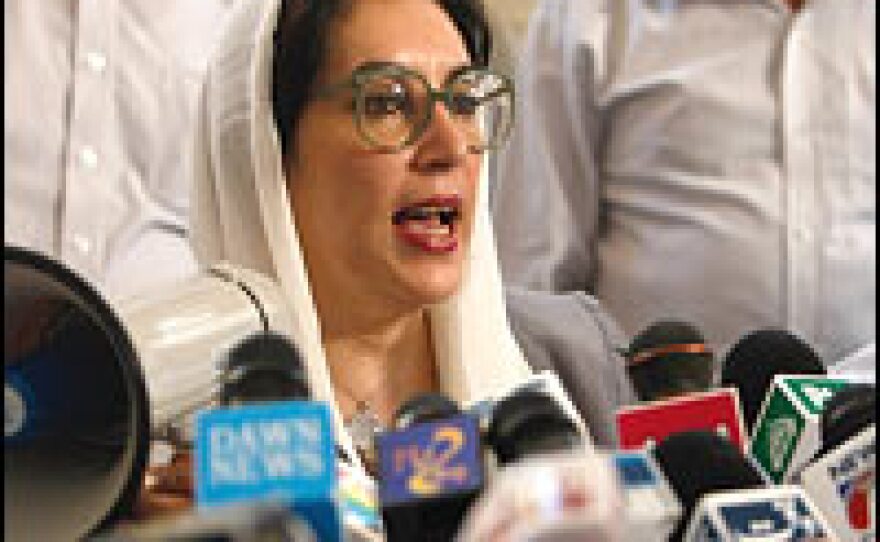The massive bombings in Karachi shattered what had been a triumphant homecoming for former Prime Minister Benazir Bhutto, but they are unlikely to stop her return to the spotlight of Pakistani politics, analysts say.
Some experts say Bhutto has a good chance of serving as prime minister for an unprecedented third term. But they question how much real power she'll have under a deal with Pakistani President Gen. Pervez Musharraf. Others say that even if she gains power, there's no indication that she'll wield it any better than she did in two previous administrations.
Selig Harrison, the director of the Asia Program at the Center for International Policy in Washington, says Musharraf wants a civilian to front for his military government.
"He wants Bhutto to be prime minister, but he wants a prime minister without much power," Harrison says. He predicts that Musharraf will rig the elections in January so that Bhutto's Pakistan People's Party will win, but not with a decisive majority.
Harrison says Bhutto's party could make an even better showing in a free and fair election, but he predicts that Musharraf's intelligence agencies will intimidate potentially strong candidates from the party and keep them from running. That, he says, should give Bhutto enough seats in parliament to become prime minister, but not enough to allow her to be independent from the military.
Another observer says that even if Bhutto returns to real power, she may not be much of an improvement over Musharraf. Zia Mian, a professor at Princeton's Woodrow Wilson School of Public and International Affairs, cites Bhutto's performance during her second administration, which began in 1993. He says it was a good time for Bhutto because she had strong working relations with the country's president, but he says it was a "bad time for Pakistan."
Bhutto's government "quickly became notorious for being corrupt and for bad management," Mian says. He says Bhutto resorted to "very draconian measures" when she was faced with opposition from a party representing muhajirs, Muslims who moved to the country from India when Pakistan was created. Bhutto's measures included "arbitrary arrests and torture of people in police custody," Mian says.
Mian also points to what he calls Bhutto's "embrace" of the Taliban movement in neighboring Afghanistan, noting that her Islamist political allies helped form the Taliban as a counterweight to a corrupt and unstable government in Kabul.
"It's very troubling," Mian says, "that she was willing to have that kind of relationship with these people. The Taliban's politics haven't changed."
Harrison of the Center for International Policy says a Bhutto victory won't threaten Musharraf's control of the country.
"Musharraf's power will be reduced, but not in the areas he really cares about," such as defense and control of Pakistan's economy, Harrison says. And that highlights the main reason that the military is holding on to power more tenaciously than it has in the past, the analyst says.
"They have established a huge conglomerate of businesses in Pakistan, so they have an economic stake," Harrison says.
Both Harrison and Mian say Bhutto's party and other opposition groups will support her, despite her willingness to deal with Musharraf.
Bhutto's party "is still at the stage of being a charismatic party rather than a democratic party," Mian says. "It was founded by Bhutto's father, and she has continued in control by centralizing decision-making."
As for those who are unhappy with the Musharraf compromise, Harrison says, Bhutto is "the only thing the opposition forces have at the moment."
Copyright 2022 NPR. To see more, visit https://www.npr.org. 9(MDAzMjM2NDYzMDEyMzc1Njk5NjAxNzY3OQ001))






